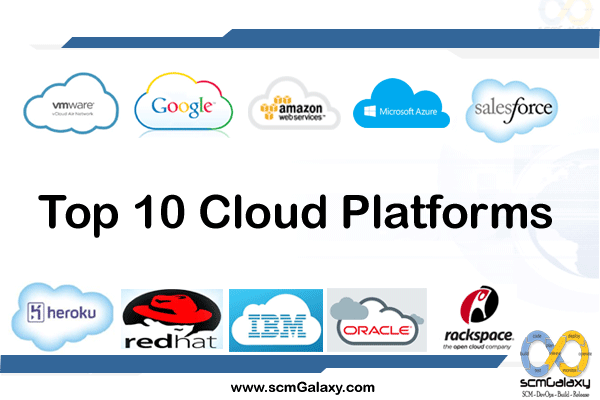

There are three models of cloud platforms
Here is the list of top 10 cloud platforms.
1. Amazon Web Services

- Service Model – IaaS
- Deployment Model – Hybrid, Private & Public Cloud
- Server operating system – Linux & windows
- Auto Scaling
- Block Storage
- VPN Access
- Cloud Storage
- Database as a Service
- Deploy servers
- DNS management
2. Microsoft Azure Cloud

- Service Model – PaaS
- Deployment Model – Private Cloud
- Server operating system – Linux windows
- Auto Scaling
- Block Storage
- Cloud Storage
- Content Delivery Network
- Deploy Servers
- Disaster Recovery
- VPN Access
- DNS Management
- Database as a Service
3. Google

- Service Model – IaaS
- Deployment Model – Public Cloud
- Server operating system – Linux & windows
- Cloud Storage
- Docker Support
- Load Balancing
- Firewalls
- Snapshots
- API (Application Programming Interface)
- Web Based Application/Control Panel
4. Rackspace

- Service Model – IaaS
- Deployment Model – Hybrid Cloud, Private Cloud, and Public Cloud
- Server operating system – Linux & windows
- Auto Scaling
- Block Storage
- Cloud Storage
- Content Delivery Network (CDN)
- Database as a Service
- Deploy Servers
- DNS Management
5. VMware

- Service Model – IaaS
- Deployment Model – Hybrid Cloud
- Server operating system – Linux & windows
- Auto Scaling
- Cloud Storage
- Load Balancing
- System Monitoring
- Web Based Application/Control Panel
- API (Application Programming Interface)
6. Salesforce

- Service Model – PaaS
- Deployment Model – Public Cloud
- Server operating system – Linux & windows
- Auto Scaling
- File Storage
- Firewalls
- Flexible Storage Services
- System Monitoring
7. Oracle

- Service Model – PaaS
- Deployment Model – Private Cloud and Public Cloud
- Server operating system – windows
- Block Storage
- Cloud Storage
- Database as a Service
- Object Storage
8. IBM

- Service Model – IaaS
- Deployment Model – Hybrid Cloud and Private Cloud
- Server operating system – Linux & windows
- Web Based Application/Control Panel
- API (Application Programming Interface)
- Messaging Services
9. Red Hat

- Service Model – PaaS
- Deployment Model – Hybrid cloud and Private Cloud
- Server operating system – windows
- Auto Scaling
- Horizontal Scaling
- Snapshots
- Vertical Scaling
- API (Application Programming Interface)
- Command Line
- Graphical User Interface
10. Heroku

- Service Model – PaaS
- Deployment Model – Public Cloud
- Server operating system – Linux & windows
- Auto Scaling
- Horizontal Scaling
- Control Interface-Command Line
So, this is my list of top cloud platforms which are trending these days. But, if you think about some other platforms than feel free to share with us in the comment section below.
I’m a DevOps/SRE/DevSecOps/Cloud Expert passionate about sharing knowledge and experiences. I am working at Cotocus. I blog tech insights at DevOps School, travel stories at Holiday Landmark, stock market tips at Stocks Mantra, health and fitness guidance at My Medic Plus, product reviews at I reviewed , and SEO strategies at Wizbrand.
Please find my social handles as below;
Rajesh Kumar Personal Website
Rajesh Kumar at YOUTUBE
Rajesh Kumar at INSTAGRAM
Rajesh Kumar at X
Rajesh Kumar at FACEBOOK
Rajesh Kumar at LINKEDIN
Rajesh Kumar at PINTEREST
Rajesh Kumar at QUORA
Rajesh Kumar at WIZBRAND

 Starting: 1st of Every Month
Starting: 1st of Every Month  +91 8409492687
+91 8409492687  Contact@DevOpsSchool.com
Contact@DevOpsSchool.com
